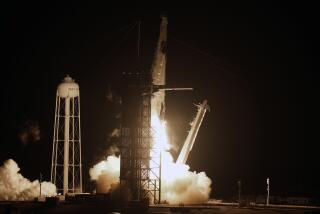Satellite Net May Be Shut Down in a Crisis
- Share via
WASHINGTON — President Bush has ordered plans for temporarily disabling the U.S. network of global positioning satellites during a national crisis to prevent terrorists from using the navigational technology, the White House said Wednesday.
Any shutdown of the network inside the United States would come under only the most remarkable circumstances, said a Bush administration official who spoke to a small group of reporters at the White House on condition of anonymity.
The GPS system is vital to commercial aviation and marine shipping.
The president also instructed the Defense Department to develop plans to disable, in certain areas, an enemy’s access to the U.S. navigational satellites and to similar systems operated by others. The European Union is developing a $4.8-billion program, called Galileo.
The military increasingly uses GPS technology to move troops across large areas and direct bombs and missiles. Any government-ordered shutdown or jamming of the GPS satellites would be done in ways to limit disruptions to navigation and related systems outside the affected area, the White House said.
“This is not something you would do lightly,” said James A. Lewis, director of technology policy for the Washington-based Center for Strategic and International Studies. “It’s clearly a big deal. You have to give them credit for being so open about what they’re going to do.”
President Clinton abandoned the practice in May 2000 of deliberately degrading the accuracy of civilian navigation signals, a technique known as “selective availability.”
The White House said it would not reinstate that practice, but said the president could decide to disable parts of the network for national security purposes.
The White House said the policies were aimed at improving the stability and performance of the U.S. navigation system, which Bush pledged would continue to be made available for free.
More to Read
Sign up for Essential California
The most important California stories and recommendations in your inbox every morning.
You may occasionally receive promotional content from the Los Angeles Times.










